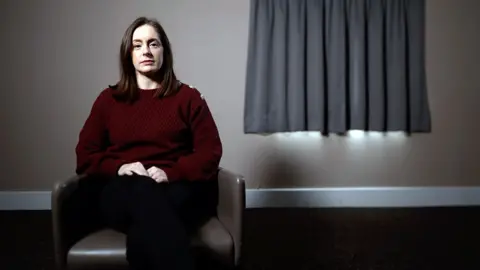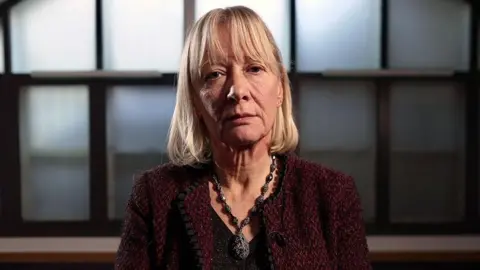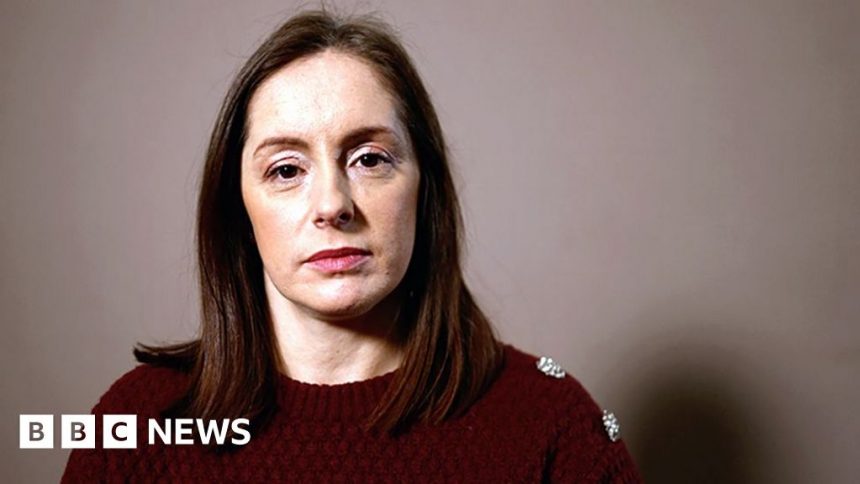‘A man exposed himself to me on a video call – police didn’t properly investigate’
 BBC
BBCIn October, business coach Rebecca Amin opened her laptop to join a video call as her children played in the room next door. When her male client turned on his camera Rebecca was shocked to find he was standing naked from the waist down.
“It was disgusting,” she says, “I felt violated.”
Rebecca decided to report the offence to the local police, believing what had happened on screen at her home in Surrey, was no less serious a matter than if it had taken place in person.
But she was disappointed by the police’s reaction. It transpired the man – who had contacted Rebecca to request career coaching – was calling from India, and police told her that they would keep details of the incident on file, but there was little they could do.
Rebecca is one of a number of victims of obscene calls and indecent exposure by strangers, who have told BBC News that police are failing to carry out proper investigations and dismissing their experiences.
The women contacted the BBC following a report highlighting failures by two forces when dealing with reports of malicious, sexualised phone calls.
Some victims of “non-contact sexual offences” – crimes that do not involve physical contact between perpetrator and victim – say they, like Rebecca, have been left feeling violated.
The minister for safeguarding, Jess Phillips, has told the BBC any suggestion police and prosecutors are not taking these offences seriously is “not tolerable”.
Police chiefs say not all victims receive the right outcomes when their cases are investigated and admit some forces have fallen short.
Rebecca posted about what had happened to her on the social media platform LinkedIn and was surprised when five women, also business coaches, reached out to say they had experienced the same thing with a man using the same profile.
She also contacted the platform that hosted her video calls. They told her they could provide an IP address for the man which would identify his device and provide information about his geolocation, if the police requested that information from them.
But despite providing police with the names and contact details for the other victims and a contact at the video-hosting platform, Rebecca didn’t hear from them again.
“It felt like they’d washed their hands of it,” Rebecca says. “It made me feel that it’s not something they could be bothered to follow up, or it’s not important enough.”
But she was fearful this offence could have been a prelude to something much more serious.
“I said to the police, ‘My concern isn’t just what he’s doing through a screen to me and to other women, but what he’s doing locally – when this isn’t enough for him anymore – to somebody he has physical access to.'”
Surrey Police only got in touch with Rebecca again after BBC News approached them for a response.
In a statement, the force said it had provided Rebecca with an apology and an update, but said delays investigating her case fall “far short” of what she should rightly expect.
“We aim to approach every investigation with care and service,” they said, “and we completely accept that we did not deliver that in this case.”
Surrey Police says Rebecca’s case is now being investigated further.
‘Police don’t look at the risk posed by the offender’
In 2020, 83-year-old Barbara Marsden told her daughter, Sally, that a workman who had visited her home in Lancashire had indecently exposed himself to her.
Sally says her mother described how the man allegedly showed her his penis.
CCTV outside Barbara’s house showed the workman undoing and then doing up the zip on his trousers.
Sally, who is a lawyer, reported the incident to police, but while the officer assigned to the case was helpful and proactive, she believes the system let her mother down.

“It was very frustrating,” Sally says. “It felt like I was driving the case.”
By the time police decided to carry out a video interview with her mother – four months later – Barbara, who has dementia, was unable to recall the details of what had happened.
Sally says she also had to carry out research to find an address for the suspect, and convince prosecutors why they should not drop the case.
It took more than three years for the case to come to trial, leaving Sally concerned the man’s crimes might have escalated.
“He targeted a vulnerable elderly person in her own home… Was he going to do something worse?
“I don’t think there’s a recognition of the fact that people who flash are actually more likely to do more serious things,” Sally says. “The police don’t look at the risk that’s posed by the offender.”
In a statement, Lancashire Police told the BBC they had received a report of an indecent exposure in 2020 and launched an investigation. A man was arrested and charged, they said, but was subsequently acquitted after a trial.
A review found the service delivered was acceptable, they added.
The man accused of indecently exposing himself to Sally’s elderly mother was later convicted in a separate case of making indecent images of a child.
‘He was making disgusting noises’
Lara Burns was on holiday in Spain with her family in October 2021 when she received an anonymous phone call. The man at the other end of the line called Lara by her name and then made obscene sexual noises and comments.
It wasn’t the first time she had received a call like this. A few months previously there had been a similar call. She had dismissed it then – but this time she couldn’t.
“I definitely got the same bloke,” Lara says. “It was in the middle of the daytime – making disgusting noises and talking about disgusting things.”
Lara, who is from Stevenage and has a teenage daughter, says she felt threatened and feared the man might also have her address, so she reported the calls to Hertfordshire Police.
“I started to think, ‘Is it someone who might know me from work? Is it someone who has just found me online?'”
Lara was interviewed by a police constable, had a more detailed conversation with another officer, and was then referred to Victim Support.
“I remember feeling quite violated,” says Lara.
She no longer felt safe going out at night and was sent a rape alarm by Victim Support.
But she says she never heard anything more from Hertfordshire Police.
Lara says the incident had a lasting adverse effect on her and believes the police could have done more to investigate.
Hertfordshire Police told the BBC they were unable to trace the origin of the calls and had tried to contact Lara several times without success, before writing to her to let her know they wouldn’t be able to “progress the investigation further”.
The force said it had “followed all proportionate lines of enquiry for offences of this nature”.
If you’ve been affected by the issues in this story, help and support is available via the BBC Action Line.
Jess Phillips says she is sorry some victims are having poor experiences.
“To suggest that non-contact sexual crimes are not serious is not tolerable,” she says. She acknowledges police resourcing is an issue, adding: “Violence against women and girls is a strategic policing priority – it is not an optional extra.”
The National Police Chiefs’ Council says it is working to improve the way these types of offences are investigated and prosecuted.
“We know there are cases where the police response has fallen short and the outcomes for the victims have not been good enough.”







